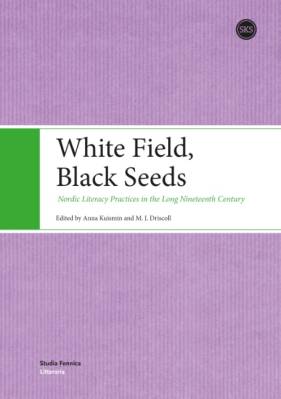White Field, Black Seeds — Nordic Literacy Practices in the Long Nineteenth Century
Kuismin, Anna; Driscoll, M.J.Tuotetiedot
| Nimeke: | White Field, Black Seeds — Nordic Literacy Practices in the Long Nineteenth Century | ||
| Tekijät: | Kuismin, Anna (Toimittaja) Driscoll, M.J. (Toimittaja) |
||
| Tuotetunnus: | 9789522224446 | ||
| Tuotemuoto: | Pehmeäkantinen kirja | ||
| Saatavuus: | Toimitusaika 7-14 arkipäivää | ||
| Hinta: | 24,00 € (21,15 € alv 0 %) | ||
|
|||
| Kust. tuotetunnus: | 1390517 |
| Kustantaja: | Suomalaisen Kirjallisuuden Seura |
| Sarja: | Studia Fennica Litteria 7 |
| Painos: | 1. painos, 2013 |
| Julkaisuvuosi: | 2013 |
| Kieli: | englanti |
| Sivumäärä: | 216 |
| Tuoteryhmät: | Historia Studia Fennica Litteraria Books in English |
| Kirjastoluokka: | 93 POHJOISMAIDEN HISTORIA |
| YSO - Yleinen suomalainen asiasanasto: | lingvistinen antropologia, sosiolingvistiikka, kansanlingvistiikka, kirjallisuudentutkimus, folkloristiikka, päiväkirjat, muistelmat, kansankirjailijat, kansankertojat, itsekasvatus, kirjallinen viestintä, kirjallinen kulttuuri, kirjoittaminen, kirjoitustaito, lukutaito, historia |
| Avainsanat: | Linguistic anthropology, Literacy, Scandinavian history, folk linguistics, sociolinguistics |
White field, black seeds - who can sow? Although the riddle from which this these words are taken comes from oral tradition, it refers to the ability to write, a skill which in most Nordic countries was not regarded as necessary for everyone. And yet a significant number of ordinary people with no access to formal schooling took up the pen and produced a variety of highly interesting texts: diaries, letters, memoirs, collections of folklore and handwritten newspapers.
This collection presents the work of primarily Nordic scholars from fields such as linguistics, history, literature and folklore studies who share an interest in the production, dissemination and reception of written texts by non-privileged people during the long nineteenth century.
This collection presents the work of primarily Nordic scholars from fields such as linguistics, history, literature and folklore studies who share an interest in the production, dissemination and reception of written texts by non-privileged people during the long nineteenth century.





